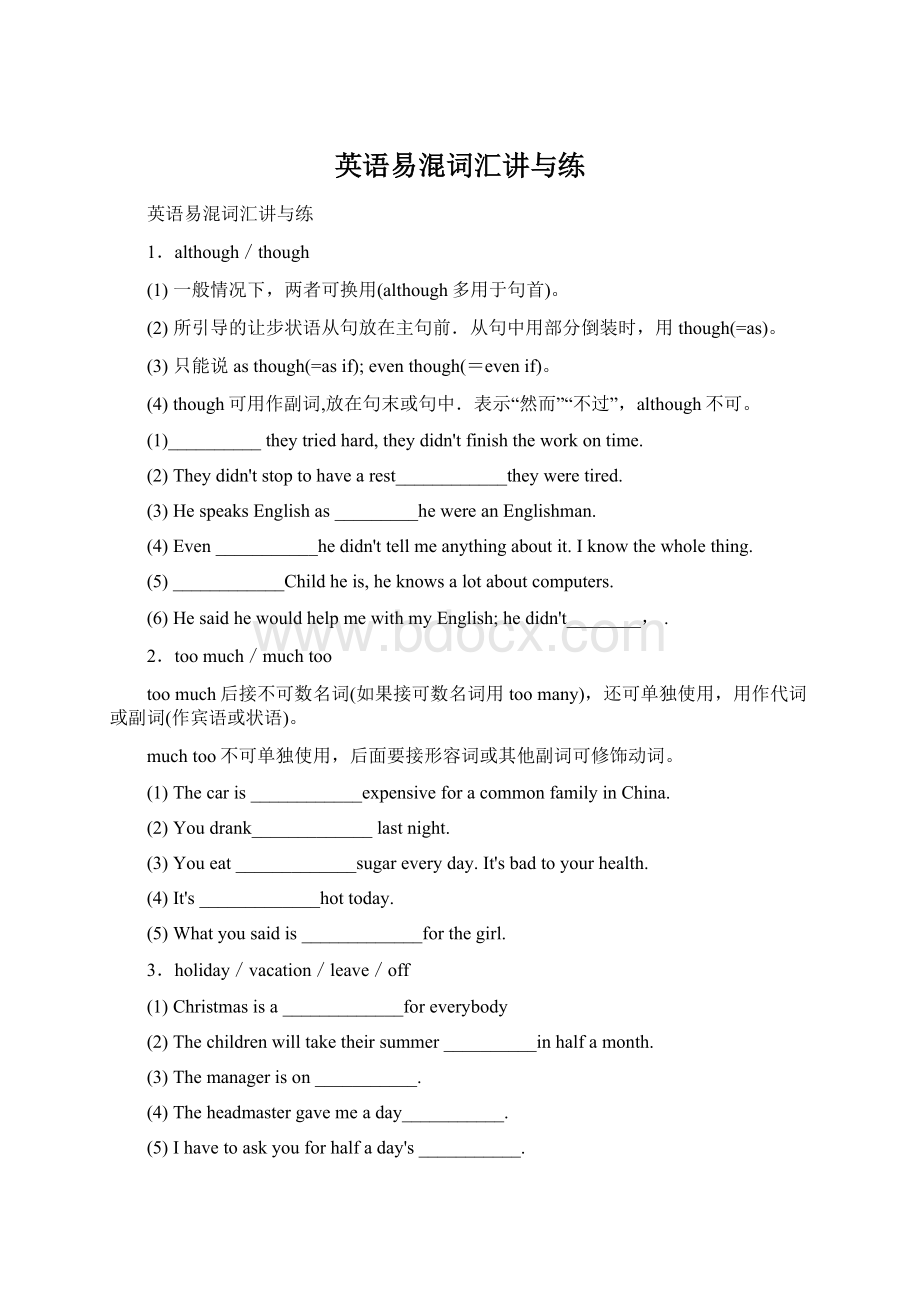英语易混词汇讲与练.docx
《英语易混词汇讲与练.docx》由会员分享,可在线阅读,更多相关《英语易混词汇讲与练.docx(27页珍藏版)》请在冰豆网上搜索。

英语易混词汇讲与练
英语易混词汇讲与练
1.although/though
(1)一般情况下,两者可换用(although多用于句首)。
(2)所引导的让步状语从句放在主句前.从句中用部分倒装时,用though(=as)。
(3)只能说asthough(=asif);eventhough(=evenif)。
(4)though可用作副词,放在句末或句中.表示“然而”“不过”,although不可。
(1)__________theytriedhard,theydidn'tfinishtheworkontime.
(2)Theydidn'tstoptohavearest____________theyweretired.
(3)HespeaksEnglishas_________hewereanEnglishman.
(4)Even___________hedidn'ttellmeanythingaboutit.Iknowthewholething.
(5)____________Childheis,heknowsalotaboutcomputers.
(6)HesaidhewouldhelpmewithmyEnglish;hedidn't________,.
2.toomuch/muchtoo
toomuch后接不可数名词(如果接可数名词用toomany),还可单独使用,用作代词或副词(作宾语或状语)。
muchtoo不可单独使用,后面要接形容词或其他副词可修饰动词。
(1)Thecaris____________expensiveforacommonfamilyinChina.
(2)Youdrank_____________lastnight.
(3)Youeat_____________sugareveryday.It'sbadtoyourhealth.
(4)It's_____________hottoday.
(5)Whatyousaidis_____________forthegirl.
3.holiday/vacation/leave/off
(1)Christmasisa_____________foreverybody
(2)Thechildrenwilltaketheirsummer__________inhalfamonth.
(3)Themanagerison___________.
(4)Theheadmastergavemeaday___________.
(5)Ihavetoaskyouforhalfaday's___________.
4.allow/permit/let/make
allow和permit在许多情况下可以换用,只是词义的强弱有些差别:
allow侧重于“听任""默许""不加阻止”;permit强调“正式认可”“批准”的意思。
Let属普通用语;make是“使┅┅”。
在使用中还要注意以下几点:
(1)可以说allow/permitsb.todo不可以说allow/permitsb.doing。
(2)可以说allow/permitdoing不可以说allow/permittodo。
(3)可以说letsb.dosth.不可以说letsb.todosth.
(4)可以说makesb.dosth.不可以说makesb.todosth.
但要说:
Sb.ismadetodosth.
1.Studentsarenotallowed____________(enter)thenet-bar.
2.Childrenarenotpermitted_____________(watch)thisplay.
3.Doyouallow__________(smoke)intheoffice?
4.Pleaseletme_____________(introduce)myself.
5.Whatmakeyou____________(think)Iamafarmer?
6.Thechildrenaremade___________(do)alotofhomeworkeveryday.
7.Thatteacheroften____________toomuchnoiseintheclassroom.
8.Schoolsdonot_________smoking.
9.Hewasangrywithmeanddidn't___________meintotheroom.
5.through/across
across(横过、穿过)着重指从一条线或一物体表面的一边到另一边。
含义与on有关。
through(穿过,从……通过)着重指空间的一头纵穿到另一头。
含义与in有关。
(1)Atrainisrunning___________thetunnel.
(2)Don'trun____________thestreetwhilethetrafficlightisred.
(3)Thereisashop_____________theroad.
(4)Idon'tthinkhewilllive__________thenight.
6.bemadefrom/bemadeof/bemadein/bemadeinto/bemadeupof
bemadeof/from意为“由......制成”。
用以制造的原材料已改变,在制成品中看不出原材料,用from;原料未改变,在制成品中仍看得出原材料,用of。
bemadein指产地,意为“在......制造,由......制造”。
bemadeinto意为“将......制成”。
与以上短语不同,它的主语为原材料。
bemadeupof指“由......组成”。
1.Thiskindofbooksismade________akindofpaperwhichismade_______bamboo.
2.Thenecklacemade_______glassinsteadofdiamondismade______GuangZhou..
3.Whatcanthispieceofwoodmade_________?
4.Theclubismade_________twentymembers.
5.Thesetablearemade________ourfactory.Theyweremade______wood.
6.Woodcanbemade________tablesandotherfurniture.
7.Chinaismade__________56nations.
7.bybike/onabike/inabus
by,in,on用于交通工具时用法如下:
表示旅行方式,不涉及交通工具时用by。
如:
byair,bywater,bysea,byland(road)。
泛指交通工具时用by,表交通工具的名词前不用冠词,不用复数词尾。
如:
byplane,bybus,byboat,bytrain。
交通工具前有冠词或物主代词等修饰词时,用in或on如:
onaredbike,on/inabus/train/ship。
交通工具前有起始或到达时间时,也可用by。
如:
by/on,the11:
00train。
“骑马,骑骆驼,步行”均用on。
如:
。
onhorseback,onahorse,Onthecamel,Onfoot。
1.Iusuallygotoschool______bus,butthismorningIwent______mybrother’sbike.
2.Iwentthere_______theNo.6busbutcameback_______myfriend’scar.
8.noone/none
(1)noone用来指人,不能接“短语,当它作主语时,谓语动词用单数
(2)none不仅指人也可指物,其后常接of短语,构成"noneof+名词/代词"结构,当名词或代词为复数时,谓语动词用单复数均可.
(3)回答howmany/howmuch引起的问句用none;回答who引起的问句用noone.
(1)_________likesapersonwithbadmanners.
(2)_________ofhisfriendscametohelphim.
(3)Almost_________believeshim.(4)_________ofthemhas/haveseenthefilm.
(5)--Howmuchcoalisleft?
--________________.
(6)--Whoenteredtheroom?
--_______________.
(7)Howmanystudentsarethereintheclassroom?
--_______________.
9.wear/dress/puton/haveon/in/bedressin/pullon/with
(1)强调动作sb.dresssb/oneself;sb.puton(衣服、鞋、帽等);sb.pullon(衣服、鞋、帽等)
(2)强调状态sb.wear(衣服、鞋、帽、手套、眼镜、头发、胡须等。
还可接颜色);sb.haveon(衣服、鞋、帽、手套等);sb.bein(颜色、衣服);sb.bedressedin(颜色、衣服)
(3)其他用法pullon表示不经心地、随随便便或匆匆忙忙地穿上/戴上。
wear可用于进行时,有时可用wearing作状语或定语
haveon不可用于进行时,也不可用现在分词作状语或定语
in除了同be连用作表语外,还可单独作定语。
dress还可用作不及物动词,指“日常的穿着”。
with只能接眼镜、手套等,用作定语。
(1)Shegotuplate,soshe_________herclothesandwenttoschoolinahurry.
(2)Sheis_________anewskirttoday.Shelooksmorebeautiful.
(3)Heisgoingout.Heis__________anovercoat.
(4)Thenursesareall_______inwhite.
(5)She_________hersonandsenthimtoschool.Thenshe_________herselfinacoatandwenttowork.Shealways________well.
(6)Whenapersonisborn,he/she_________nothingWhenhe/shedies,he/shecarriesnothing.
(7)Whendidyougettheshoesyou________yesterday?
(8)Shelikesto_________black(clothes).
(9)Thegirl_______redisourmonitor.
(10)Thewomanteacher_______glassesEnglishteacher.
10.agreeon/agreewith/agreeto
agreeon表示在某一点上达成协议或取得一致意见
agreewith表示同意、赞成某人说的话,后接sb.或wh-从句,或表达意见,想法,观点,决定的词(opinion,view,idea,decision)还可以表示"与.....一致,适合";此时主语一般不是表示人的词.
agreeto后接计划、安排、建议、条件等词(plan,arrangement,suggestion,terms).agreetodo。
表示“同意做某事”。
(1)I_________whathesaid.
(2)Afterafurtherdiscussion,bothsides________thedateforthenextmeeting.
(3)Theydidn't_________eachotheronthatpoint.
(4)Averbshould________itssubjectinnumberandperson.
(5)Atlasttheteacher_________givehimanotherchance.
(6)Doyou_________thearrangement?
(7)Theyall_________thematter.
11.spend/cost/take/pay
(1)sb.spendsometime/moneyonsth.或sb.spendsometime/moneyonsth.或sb.spendsometime/money/(in)doingsth
(2)sth.costsb.somemoney/time/life/health
(3)Ittakessb.sometimetodosth.或sb.takesometimetodosth或sthtakesbsometimetodo
(4)sb.pay(sb.)somemoney(for)sth.
(1)It________himthreeyearstowritethebook.
(=He________threeyearstowritethebook.Thebook______himthreeyearstowrite.
=He_______threeyearswritingthebook.)
(2)Everyyearhe_______alotofmoneyonbooks/inbuyingbooks.
(3)Thisdictionary________me100yuan.
(4)Makingexperimentlikethat__________muchtimeandlabour.
(5)Carelessdrivingmay________youyourlife.
(6)Theyhavedecidedto_________70000yuanforthenewlybuilthouse.
(7)We'll_________youinafewdays,whenIhavemoney.
12.anumberof/thenumberof
anumberof的意思是“一些:
许多”,相当于many,用于修饰可数名词。
它所修饰的名词作主语时,中心词是复数名词,谓语动词用复数形式。
thenumberof的意思是“......的数量;号码”。
当它与后面的名词连用时,中心词是thenumber。
如果用作主语,即使后面的名词是复数,谓语也要用单数。
(1)Doyouknow_________mytelephone?
(2)_________treesplantedinourvillageisneverunder200everyyear.
(3)Wehavelivedherefor__________years.
(4)__________joblesspeoplegrowsinthecountryatpresent.
(5)__________studentsareplayingfootballontheplayground.
(6)__________studentsinourclassisover70.
13.sound/noise/voice
(1)sound指各种听得见的声音,这种声音可以是悦耳的,也可以是不悦耳的。
(2)noise指各种“噪音;响声;喧闹声”。
(3)voice指人的说话声、歌声或笑声,也可以指鸟鸣声,还可以用于比喻。
(1)Iheardastrange________inthenextroom.
(2)Shelistenedtothelow_________,sadofthesea.
(3)Themanagermustbeinthenextroom.Iheardhis_______.
(4)Don'tmakesucha________.
(5)The________fromthatfactorymakesitdifficultformetogotosleep.
(6)________travelsfast,butlighttravelsfaster.
(7)Thebabycriedattopofhis_________.
14.asmanyas/asmuchas
asmanyas意为“多达……,……之多”,常用在人或物的具体数量前,结构为:
asmanyas+数词+复数名词。
asmuchas常用在“雨量、水量、时间量、重量、钱数.、价格”等方面,表示“总量”和“单位量”的大小,结构为:
asmuchas十数词+复数名词。
比较:
...倍数+asmany+复数名词+as;…倍数+asmuch+不可数名词+as。
(1)__________250000peoplelosttheirhomesintheearthquake.
(2)Therainisplentifulhere,often________seventyincheseveryyear.
(3)Atthejob,shecouldearn________eightydollarsaweek.
(4)Thecivilwarinthatcountrylasted_________16years.
15.prepare/preparefor/get(be)ready
(1)get/beready意为“准备好”,强调准备的结果。
常见结构有:
①getready(forsth.)②getsth.Ready③beready(forsth)④bereadytodo(准备干某事,乐于干某事)
(2)prepare意为“准备”,强调准备的动作与过程。
宾语是这一动作的承受者。
其后也可接双宾语,还可接不定式。
(3)preparefor意为“为......做准备”,for的宾语不是动作的承受者,而是表示准备的目的,即所要应付的情况。
prepare常见结构如下:
preparesth.准备某物(事);
preparesth.forsth.为……做……准备
preparetodosth.准备做某事
prepareforsth.为某事做准备’
preparesb.forsth.使某人对某事有思想准备
bepreparedforsth.准备好应付某事
(1)Motherwasbusy________lunchinthekitchenwhenIgothome.
(2)Thedoctortoldthenursesto________theoperationatonce.
(3)We_________todoanythingforthepeople.
(4)Willyouhelpme__________theparty?
(5)Please________byseveno'clocktomorrowmorning.
(6)Theteacheris__________theexam.
(7)Thestudentsare_________theexam.
(8)Willyou_______herforthebadnewsthatiscoming?
16.discover/invent/find
discover指“发现”原本存在而未为人所知的东西。
discover还作"发现(某种情况)”讲,后面可以接名词、代词、复合宾语、宾语从句;invent指“发明”原本不存在的东西;find指“找到”原本丢失的东西。
(1)Electricitywasn't_________byEdison,buthe_________theelectriclight.
(2)Haveyou_________thebikeyoulostlastweek?
(3)We________hertoagooddoctor.
(4)Thiskindofmachinewas_________manyyearsago.
17.complete/finish/end‘
(1)词义方面:
finish是一般用语,常用于完成日常活动,有时指“吃完”;complete是较正式的用语;常用于完成预定的任务、工程、建设等,有时含有“使...…变得完整起来”的意思;end是指“结束”或“终止”某项活动,不强调该活动是否圆满完成。
(2)结构方面:
finish后接名词、代词或动词—ing形式;complete后接名词或代词;end后接名词或介词短语。
(3)词性方面:
finish和end还可用作不及物动词,complete不可,但是complete可以用作形容词,意为“完整的,全部的”,用作表语或定语。
finished可以用作表语或定语。
(1)Thistermwill______